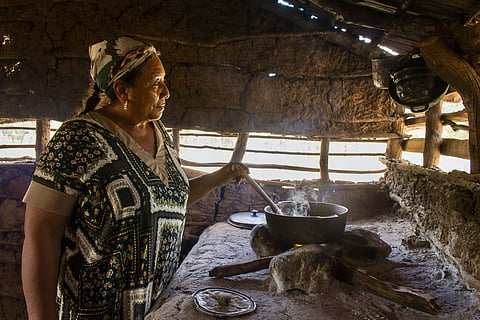Reciprocity Project Highlights Indigenous Storytelling and Values
by Victor Simoes
Reciprocity Project, a series of seven Indigenous-made documentary short films, combines Native American storytelling with climate awareness and other intersectional movements rooted in Indigenous guardianship, social justice, and human rights. The first season of the project debuted on Oct. 10, and it's already available to stream.
The project is a collaboration between Nia Tero, a Seattle-based nonprofit centered around Indigenous peoples' struggles, and Upstander Project, an initiative dedicated to uplifting suppressed voices through events and media productions, in association with REI Co-op Studios, the content producer branch of the Pacific Northwest-based brand of clothing and gear REI Co-op.
The multimedia platform series's episodes range from six to 14 minutes and aim to answer the question, "What does reciprocity mean to your community?" Showing how embracing Indigenous values systems and recognizing that humanity is in a relationship with Earth, a place that once was in balance, can help us fight the climate crisis.
"To support thriving peoples in thriving places, we must invest in Indigenous storytellers," Tracy Rector, managing director at Nia Tero, wrote in an email to the Emerald. "To Indigenous values and frameworks, when one heals, more will heal. Where one thrives, more will thrive."
ᎤᏕᏲᏅ (What They've Been Taught), the second short film of the series, explores what reciprocity means in Cherokee traditions. The film centers on an elder and first-language speaker dealing with a community effort to maintain a balanced environment through the frameworks of Cherokee communities.
"Through digital networks, film, television, podcasts, learning materials, online streaming, and a variety of print and broadcast materials, Nia Tero's Storytelling team fosters the storytelling ecosystem of Indigenous guardianship," said Rector. "How these stories are created and moved in the world matters, and they must be fostered with care, courage, and creativity, as few are engaged in this vital work."
Another highlight of the series is WECKUWAPASIHTIT (Those Yet to Come). The fourth installment of this project underlines the intersections of tradition and healing in occupied land. In this chapter, children of the Koluskap community heal by reconnecting with ancestry and the traditions of tattoo medicine.
Rector explained that activism and Native American and Indigenous content come together when we recognize the gains and successes of Indigenous peoples in film and media. Shedding light on ancestors and forerunners who paved the way for the fantastic visibility today and on the constant awareness and proactive work to advocate for more equity, access to resources, and narrative sovereignty will continue to solidify the foundations of Indigeneity.
Reciprocity Project recently received two nominations for the 38th IDA Documentary Awards and is available online and for free at the series's website and on REI's YouTube channel.
"The best way to support Native American productions is to go see the work, help fund the work, get the word out, and advocate for Indigenous-made stories to be included in curriculums and learning materials as part of the educational system," said Rector.
For more from Nia Tero, check out their Seedcast essay series at the Emerald.
Victor Simoes is an international student at the University of Washington pursuing a double degree in journalism and photo/media. Originally from Florianpolis, Brazil, they enjoy radical organizing, hyper pop, and their beloved cats. Their writing focuses on community, arts, and culture. You can find them on Instagram or Twitter at @victorhaysser.
Featured Image: A scene from "SU"KU"JULA TEI" (Stories of My Mother) by director David Hernndez Palmar, part three of the Reciprocity Project's first season. In the film, Rosa, a wise Wayuu woman, teaches a lesson about reciprocity to her grandchildren. (Photo: Ernesto Acosta Cepeda)
Before you move on to the next story …
The South Seattle Emerald™ is brought to you by Rainmakers. Rainmakers give recurring gifts at any amount. With around 1,000 Rainmakers, the Emerald™ is truly community-driven local media. Help us keep BIPOC-led media free and accessible.
If just half of our readers signed up to give $6 a month, we wouldn't have to fundraise for the rest of the year. Small amounts make a difference.
We cannot do this work without you. Become a Rainmaker today!
Help keep BIPOC-led, community-powered journalism free — become a Rainmaker today.


